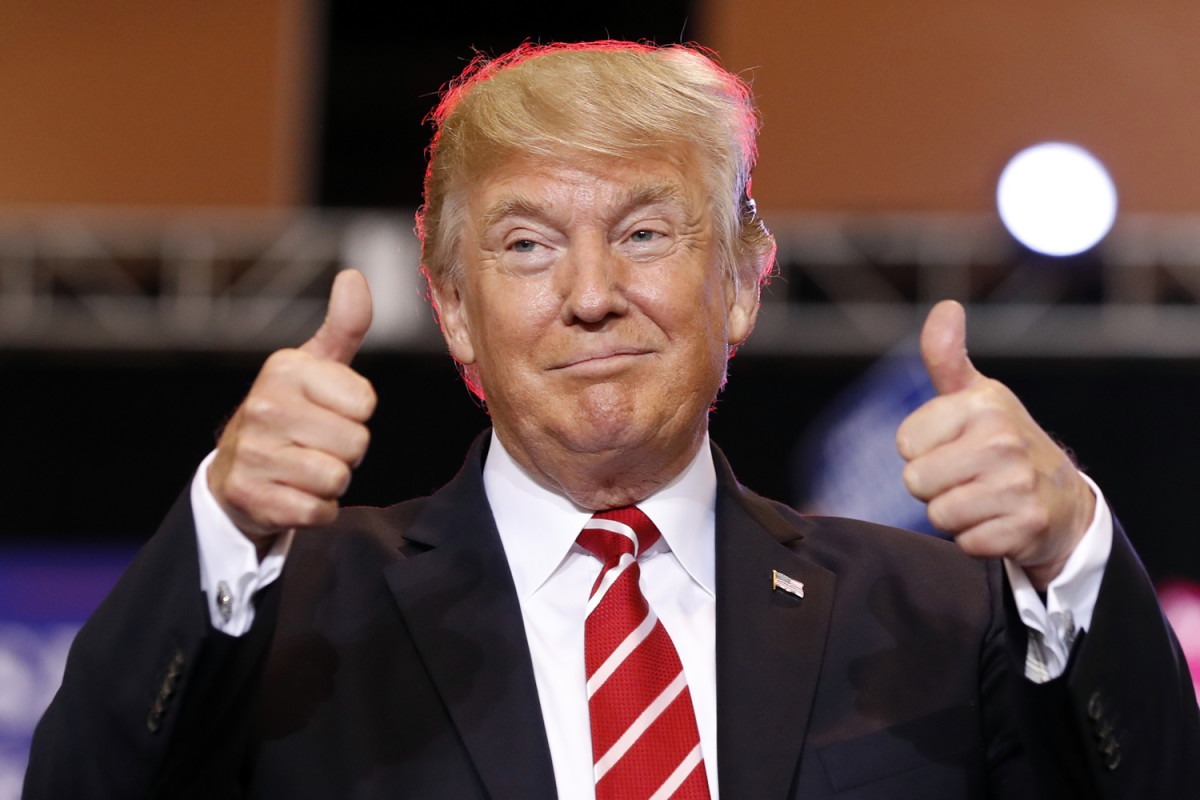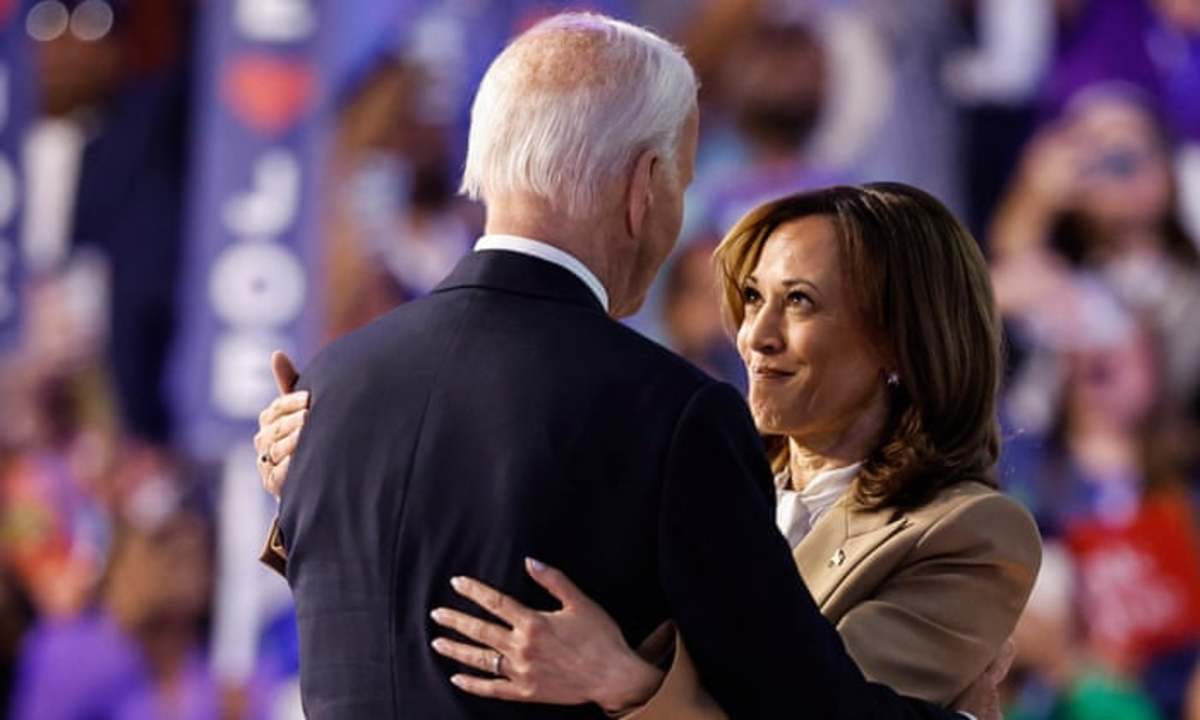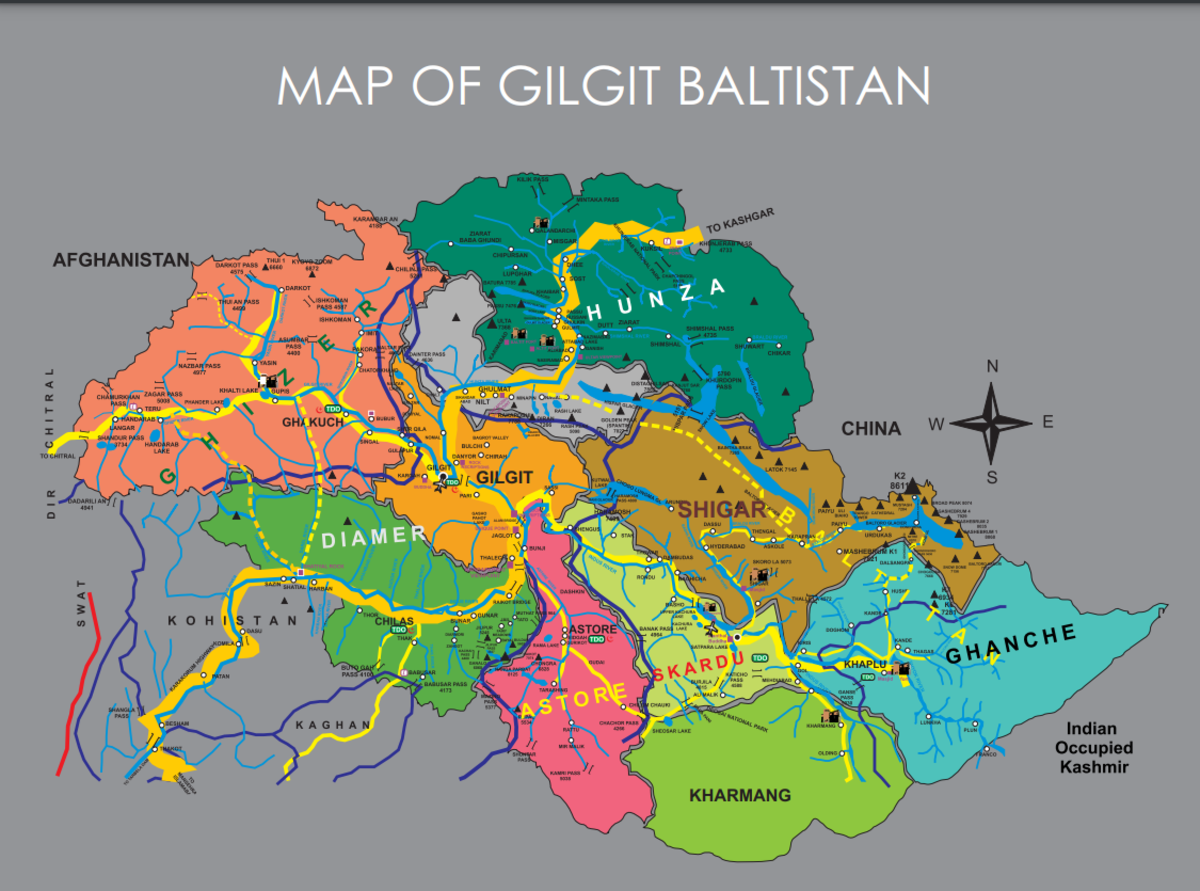Not. One. Word.
Update, 7/27/15
What a difference four years can make!
In President Obama's second term, he has taken a much tougher stance on climate change, frequently speaking about it. He has continued to take Executive action to do what can be done by that branch of government to address the problem--a pattern capped by the US-China emissions accord, announced in November 2014. Mischaracterized by some as a giveaway in which US reductions are matched only by a Chinese pledge to act in 2030, the agreement in fact marks an historic inflection point in Chinese climate policy. To meet the pledge, China had to act immediately to transition away from coal power to renewable and nuclear energy. The months since have demonstrated that China is doing just that.
But the American situation has shifted, too: with 2014 coming in as the warmest year in the instrumental temperature record, and 2015 on track to smash that record, it has become difficult to deny that the global warming trend is indeed continuing. Public opinion continues to shift toward concern about climate change. Now we see Democratic presidential candidates doing something that President Obama did not do: make climate change a major part of their campaigns.
Hillary Clinton, the Democratic front-runner, promises to double US clean energy capacity above existing policy, adding half a billion solar panels by the end of her first term. Indeed,
...tackling climate change has been central to Clinton’s campaign so far. In her campaign kick-off speech, she promised to make America “the clean energy superpower of the 21st century” and condemned Republican politicians for willfully ignoring the science behind human-caused warming. Her campaign chairman John Podesta was the architect of President Obama’s plan to tackle carbon emissions through regulations, and Clinton has promised to keep those regulations in place "at all costs."
Challengers Martin O'Malley and Bernie Sanders are not far behind. The former proposes to end fossil fuel use completely by 2050, and is critical of President Obama's timidity in relation to climate change:
“We cannot meet the climate challenge with an all-of-the-above energy strategy, or by drilling off our coasts, or by building pipelines that bring oil from tar sands in Canada,” O’Malley wrote in an op-ed published last month.
Sanders has no official climate change plan yet, but also seek to go well beyond Obama climate change policies, with a carbon tax, greatly increased renewable energy, energy efficiency measures, and international leadership by the US.
- Hillary Clinton's Plan To Combat Climate Change With Half-A-Billion Solar Panels | ThinkProgress
The Democratic presidential candidate is going all in on renewable energy--and her challengers aren't far behind. - FACT SHEET: U.S.-China Joint Announcement on Climate Change and Clean Energy Cooperation | whitehous
Official information on the US-China emissions pact
Update: 2/13/2013 (initial paragraphs, 1/21/2013)
During the recent Presidential election, I wrote the following words:
Three hundred and sixty minutes of televised political debate, six entire hours, and not once did the words “climate change” pass the lips of any of the candidates.
I found it shocking that that should be the case, and went on--in the original post, headlined below--to describe why. Superstorm Sandy brought the issue back into the campaign, despite the intention of both candidates to ignore it, and the President has been slightly more articulate on the subject since, if still somewhat circumspect.
However, in his Second Inaugural Address, we find the following paragraph:
We, the people, still believe that our obligations as Americans are not just to ourselves, but to all posterity. We will respond to the threat of climate change, knowing that the failure to do so would betray our children and future generations. Some may still deny the overwhelming judgment of science, but none can avoid the devastating impact of raging fires, and crippling drought, and more powerful storms. The path towards sustainable energy sources will be long and sometimes difficult. But America cannot resist this transition; we must lead it. We cannot cede to other nations the technology that will power new jobs and new industries – we must claim its promise. That is how we will maintain our economic vitality and our national treasure – our forests and waterways; our croplands and snowcapped peaks. That is how we will preserve our planet, commanded to our care by God. That’s what will lend meaning to the creed our fathers once declared.
That is an effective use of the Presidential 'bully pulpit'--a clear and effective statement about our reasons to address the issue of climate change, from intergenerational justice to economic wisdom to environmental prudence. It is the 16th paragraph, as formatted; but it is the third substantive issue to be specifically addressed, following economic equality and combined treatment of healthcare and emergency service. To my eye, it is an unexpectedly prominent position for an issue that has so far been resolutely soft-pedaled.
Does it signal a new and more assertive approach by the second Obama administration to the challenge of climate change?
I, for one, hope so. And I'll do my best to keep you up to date on just that question as we go forward.
Update: 2/13/2013
In the President's State of the Union speech we find the following remarks:
Now is the time to reach a level of research and development not seen since the height of the Space Race. And today, no area holds more promise than our investments in American energy.
After years of talking about it, we are finally poised to control our own energy future. We produce more oil at home than we have in 15 years. We have doubled the distance our cars will go on a gallon of gas, and the amount of renewable energy we generate from sources like wind and solar – with tens of thousands of good, American jobs to show for it. We produce more natural gas than ever before – and nearly everyone’s energy bill is lower because of it. And over the last four years, our emissions of the dangerous carbon pollution that threatens our planet have actually fallen.
But for the sake of our children and our future, we must do more to combat climate change. Yes, it’s true that no single event makes a trend. But the fact is, the 12 hottest years on record have all come in the last 15. Heat waves, droughts, wildfires, floods – all are now more frequent and more intense. We can choose to believe that Superstorm Sandy, and the most severe drought in decades, and the worst wildfires some states have ever seen were all just a freak coincidence. Or we can choose to believe in the overwhelming judgment of science – and act before it’s too late.
Now the good news is, we can make meaningful progress on this issue while driving strong economic growth. I urge this Congress to get together, pursue a bipartisan, market-based solution to climate change, like the one John McCain and Joe Lieberman worked on together a few years ago. But if Congress won’t act soon to protect future generations, I will. I will direct my Cabinet to come up with executive actions we can take, now and in the future, to reduce pollution, prepare our communities for the consequences of climate change, and speed the transition to more sustainable sources of energy.
Four years ago, other countries dominated the clean energy market and the jobs that came with it. We’ve begun to change that. Last year, wind energy added nearly half of all new power capacity in America. So let’s generate even more. Solar energy gets cheaper by the year – let’s drive costs down even further. As long as countries like China keep going all-in on clean energy, so must we.
In the meantime, the natural gas boom has led to cleaner power and greater energy independence. We need to encourage that. That’s why my Administration will keep cutting red tape and speeding up new oil and gas permits. That’s got to be a part of an all-of-the-above plan. But I also want to work with this Congress to encourage the research and technology that helps natural gas burn even cleaner and protects our air and water.
In fact, much of our new-found energy is drawn from lands and waters that we, the public, own together. So tonight, I propose we use some of our oil and gas revenues to fund an Energy Security Trust that will drive new research and technology to shift our cars and trucks off oil for good. If a non-partisan coalition of CEOs and retired generals and admirals can get behind this idea, then so can we. Let’s take their advice and free our families and businesses from the painful spikes in gas prices we’ve put up with for far too long. I’m also issuing a new goal for America: let’s cut in half the energy wasted by our homes and businesses over the next twenty years. The states with the best ideas to create jobs and lower energy bills by constructing more efficient buildings will receive federal support to help make that happen.
It sounds like a serious doubling down on climate change for the second term. Let's hope that the Republicans respond in a more constructive fashion than the knee-jerk denialism of Marco Rubio's 'rebuttal' remarks suggest.
Original Post
The economy casts a long shadow in history: the Great Depression, eight decades now in the past, still affects the attitudes of living people (me among them.) And the lives of people looking for work and not finding it now will be different, permanently, because of that.
Foreign policy matters. People live or die because governments act wisely or foolishly. Again, lives change, permanently.
Health care matters. How we care (or don’t) for the sick and helpless among us affects all of society, economically, morally and politically. When illness isn’t dealt with, lives change, permanently.
And justice matters. The rights and realities of women, of minorities, of crime victims, and yes, even of criminals, need our attention: everywhere, lives are changing in ways good or bad, and the effects of those changes ripple outward to make our world a little better, or a little worse.
But all of those things got a word. Yet nothing will change more lives, more permanently and decisively, than climate change.
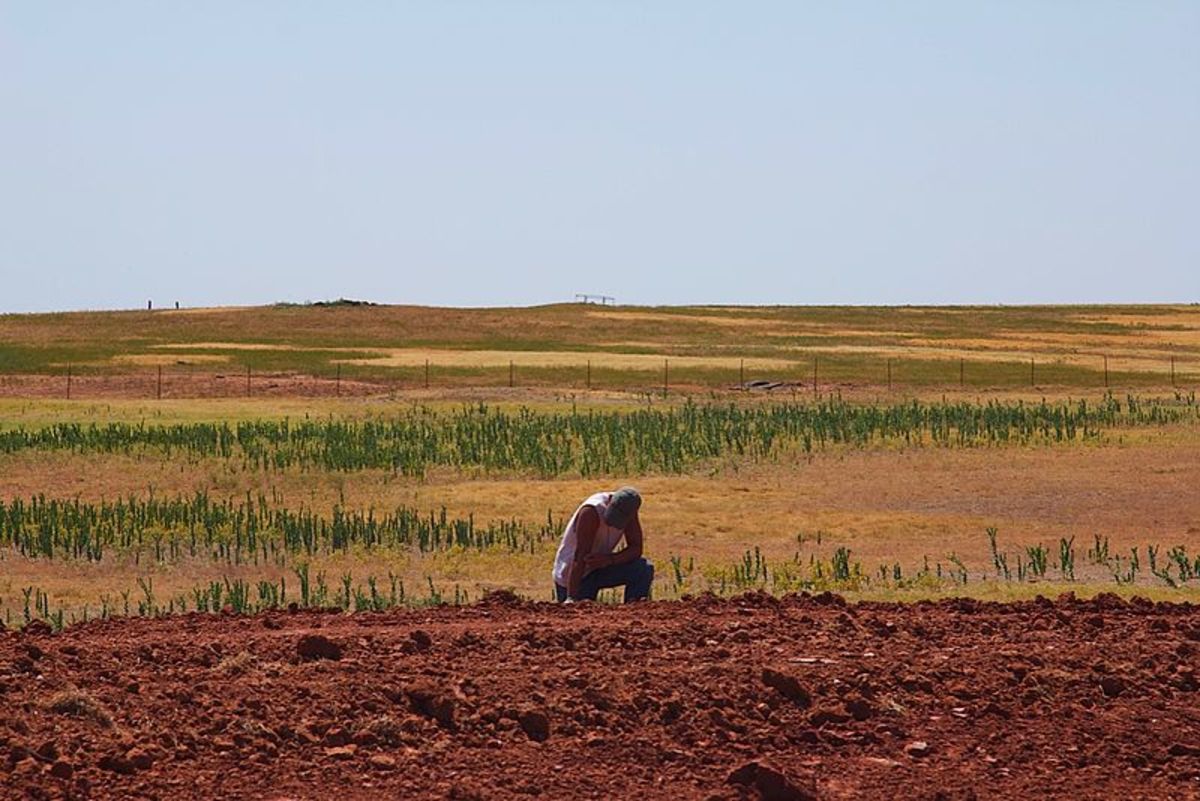
It’s not as if we didn’t have clues: indeed, if you believe (as Presidential candidates are ritualistically required to do) in a Providential God, one steering his chosen people to do the right thing, then we got three big ones—and still didn’t pay attention.
First, we got the drought.
On The Drought
- Corn States Lead Record Crop-Loss Payout: BGOV Barometer - Bloomberg
The worst U.S. drought since the 1950s may trigger record crop insurance payouts, concentrated in corn-producing states led by Illinois, Indiana and Missouri.
According to the USDA:
...the severe 2012 U.S. drought has had major impacts on the production of many field crops this year, particularly corn, soybeans, sorghum, and hay. What had started out as a promising year for U.S. crop production, with high total acreage planted and favorable early-season planting conditions has turned into one of the most serious adverse weather situations in decades.
Insured crop losses are estimated at $25 billion—much of which will be paid by taxpayers.
Is this due to human-induced climate change? We won’t know for sure until (and unless) the question is formally studied; ‘attribution’ of particular events is notoriously tricky. But what we do know is that such droughts are forecast to increase—drastically—in the American Southwest and Midwest as climate change continues.
It’s quite possible that the drought was an effect of warming to date—but it’s definitely a foretaste of what we can expect, increasingly.
On The Sea Ice
- A Love Story And A Clearance Sale
Arctic sea ice is 'far away' for most of us--but will it become 'long ago', too? There's reason to fear just that--here's why the author cares, and why more practically-minded readers should, too. - Poles apart: A record-breaking summer and winter | Arctic Sea Ice News and Analysis
Second, we got a record low Arctic sea ice extent—a shocking new low, 15 to 20% lower than the previous ‘shocking low’ of 2007. It’s a stunning rebuke to those who assured us all that 2007 was a fluke, that the ice would soon be recovering, and a stunning rebuke to those who had assured us that at least we had most of the rest of this century to act to save the Arctic sea ice. Most of all, it was a stunning rebuke to those who want to believe that human activity can’t reshape the world on an enormous scale.
We don’t know in detail what this change will do. Of course, it will allow greatly expanded Arctic navigation. And of course, it can’t be good for species reliant upon the ice. It’s fair to expect that Northern communities will have to face numerous disruptions—notably to hunting and food security, transport, and infrastructure. But we don’t know, really, how it will affect the rest of us. Northern hemispheric circulation will change—but how? Will we see more ‘blocking events’ acting to increase extremes of heat, cold, rain and drought? Perhaps. We certainly will see increased planetary warming.
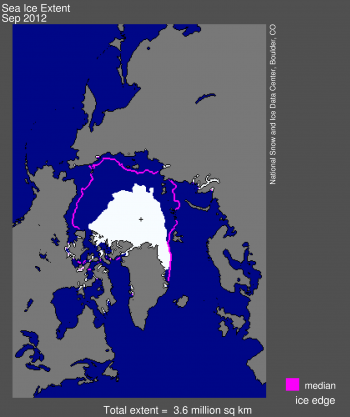
Third, we got a record-warm year in the US.
The January-September period was the warmest nine months of any year on record for the contiguous United States. The national temperature of 58.9 F was 3.8 F above the 20th century average, and 1.3 F above the previous record warm January-September of 2006. During the nine-month period, 46 states had temperatures among their ten warmest, with 25 states being record warm. Only Washington had statewide temperatures near average for the period.
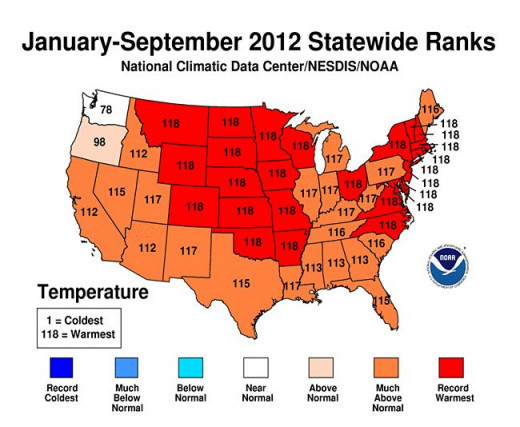
On The Warmth
- State of the Climate | National Overview | September 2012
a summary of national and regional temperatures and precipitation, placing the data into a historical perspective
In global terms, 2012 will go down as warm, but not extremely so—not by the standards of the ‘new climate normal’ as we experience it in our brave new millennium.
But it’s a US election year. That Providential God watching His chosen tribe choose their leadership for another four year term—if that is what we believe—apparently sent three very big signs.
And was ignored:
Not. One. Word.
Why does it matter?
Consider the code words we heard: Mr. Obama’s “clean energy,” and “energy of the future.” Mr. Romney’s “Solyndra” and “boondoggle.”
This election will strongly influence the future shape of America’s energy infrastructure—and thus the shape of world greenhouse gas emissions—for decades. In doing so, it may be expected to shape the climate of the world for centuries.
Last night, Mr. Romney put forth as the very first item of his economic plan the goal of “North American energy independence.” To achieve this, he would remove all checks on the use of coal—the dirtiest energy source of all—and expand oil and gas production on Federal lands. He would retain subsidies for oil companies—but eliminate them for the forms of renewable energy, which he nevertheless says he “loves.” And he would bring the Keystone XL project to fruition as quickly as possible—locking in America’s addiction to the dirtiest oil source of all, the Alberta tar sands.
On The Pipeline
- Keystone Pipeline - Wikipedia, the free encyclopedia
- Keystone pipeline would be very costly - San Antonio Express-News
[...] mining the near-surface tar sands in Canada means clear-cutting boreal forests the size of New York state and replacing the many lakes with pools of sludge and heavy metals. Because this is not normal petroleum, it uses enormous energy to mine - Keystone XL Pipeline Project
Once built, that pipeline will operate for decades: its cost is expected to be around $7 billion dollars, an investment which will not easily be abandoned, and according to TransCanada, the proprietor, the contracts with oil companies (already signed) are for 17- and 18-year terms.
As with Keystone XL, so with the wells that would be drilled on Federal lands, so with the coal mine expansions. Decades worth of commitment to dirty energy.
To be sure, Mr. Obama is no environmentalist saint. “I love pipelines,” he said, and his actions back that up: it was his March 22 executive order that began work on the southern leg of Keystone XL. This led to the October 4 arrest of 78 year-old Eleanor Fairchild, who was arrested for trespassing on her own land, which had been seized by eminent domain in order to build the pipeline leg. (The incident gained added notoriety from the arrest of actress Daryl Hannah, who stood with Ms. Fairchild in front of an excavator preparing the ground.)
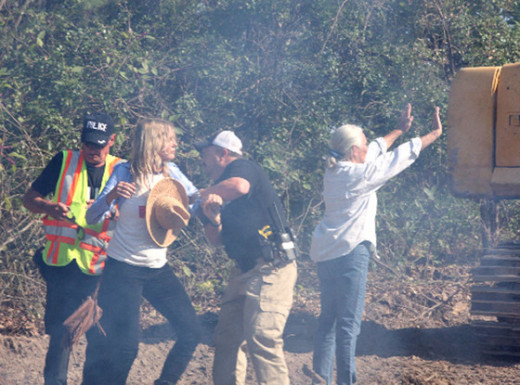
On Obama, Hannah And Fairchild
- Actress Daryl Hannah arrested in Keystone pipeline protest| Reuters
SAN ANTONIO (Reuters) - Actress Daryl Hannah was arrested in Texas on Thursday after she stood in front of an earth-moving machine clearing ground for the construction of the controversial Keystone XL
Yet what Mr. Obama said in the second debate is also true: “So, I’m all for pipelines. I’m all for oil production. What I’m not for is us ignoring the other half of the equation.”
That is, the “energy of the future”—wind, solar, and biofuels. The $90 billion “green jobs” program derided (falsely) by Mr. Romney has borne fruit:
Before President Obama took office, the U.S. had 25 gigawatts of wind power, and the government’s ‘base case’ energy forecast expected 40 GW by 2030. Well, it’s not quite 2030 yet, but we’ve already got 50 GW of wind. We’ve also got about 5 GW of solar, which isn’t much but is over six times as much as we had before Obama.
Moreover, the default rate has been very low—losses so far have amounted to only around 15% of the budgeted loss reserve, and of 33 companies receiving funds, only 3 have failed—and one of them, Beacon Energy, repaid most of its loan during receivership, was bought by a private equity firm, and continues operations today.
All of which would have been very interesting, during the debates; but we heard—
Not. One. Word.
On The "Green Jobs Boondoggle"
It would be nice to have a clear choice between good and bad. It would be nice to have our choice laid out clearly. And it would be nice to know that our system acts to concentrate attention on the issues that matter the most.
But one has to play the hand one is dealt.
So, think long and hard. Ask questions—of people, of media, and of the Net. Think some more. Talk to your friends.
And if you’re American, take the results of that process of inquiry and thought, and go vote on November 6.
It matters.
Update--10/27/2012
MTV asks the President directly about climate change.
- Sandy: Once In A Generation?
It's already clear that superstorm Sandy has been an enormous disaster. But is this really a "once in a generation" event? Or are the 'climate dice' loaded?
Update--10/31/2012
We are now, unhappily, forced to add a fourth Providential reminder that climate change can cost money: superstorm Sandy has struck the Northeast a sledgehammer blow, with estimates of damage and economic loss double that of drought's insured crop losses--and up.
I am skeptical of those estimates. We have never before had to repair and rebuild a major subway system that has suffered extensive saltwater immersion, and therefore we have no good idea yet how expensive that will be, how long it will take, or how long the economic losses due to transportation bottlenecks will continue. (Major Bloomberg thinks less than a week. I hope he is correct.)
It's unclear to what extent Sandy was 'juiced' by climate change. So we can't be sure to what extent we can attribute the tab--whatever eventually turns out to be--to that cause. Yet this event is a vivid reminder that we are unable to say what the limits to the risks of our continued CO2 pollution of the atmosphere actually are--and that failing to consider those risks realistically is extremely unwise and irresponsible.


